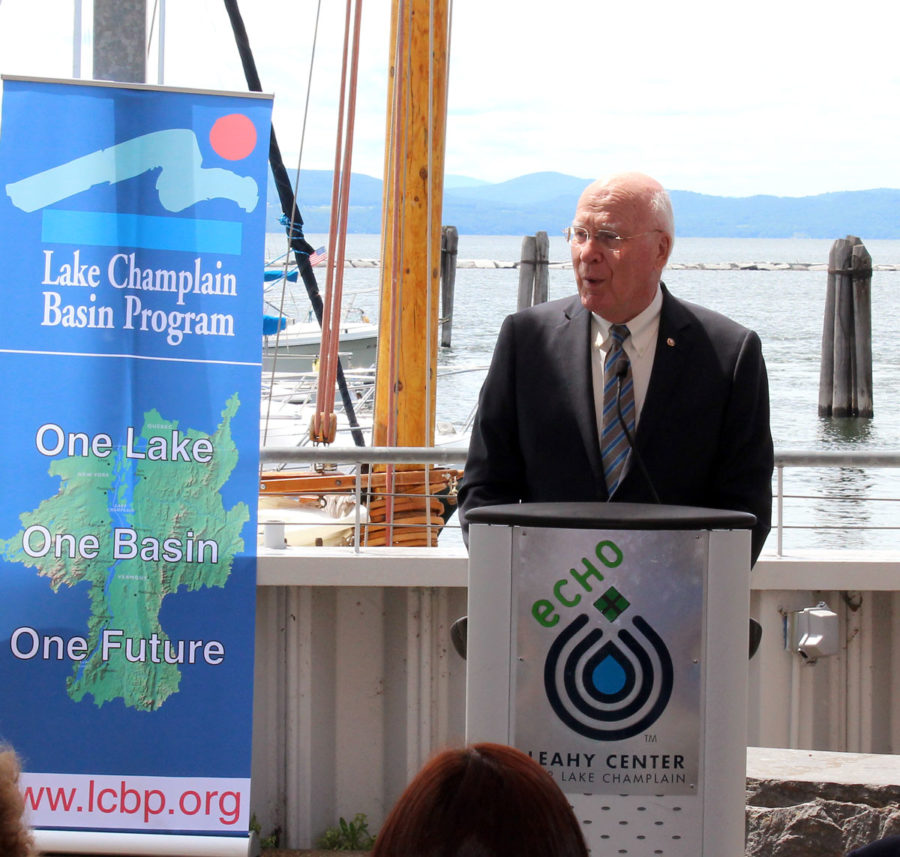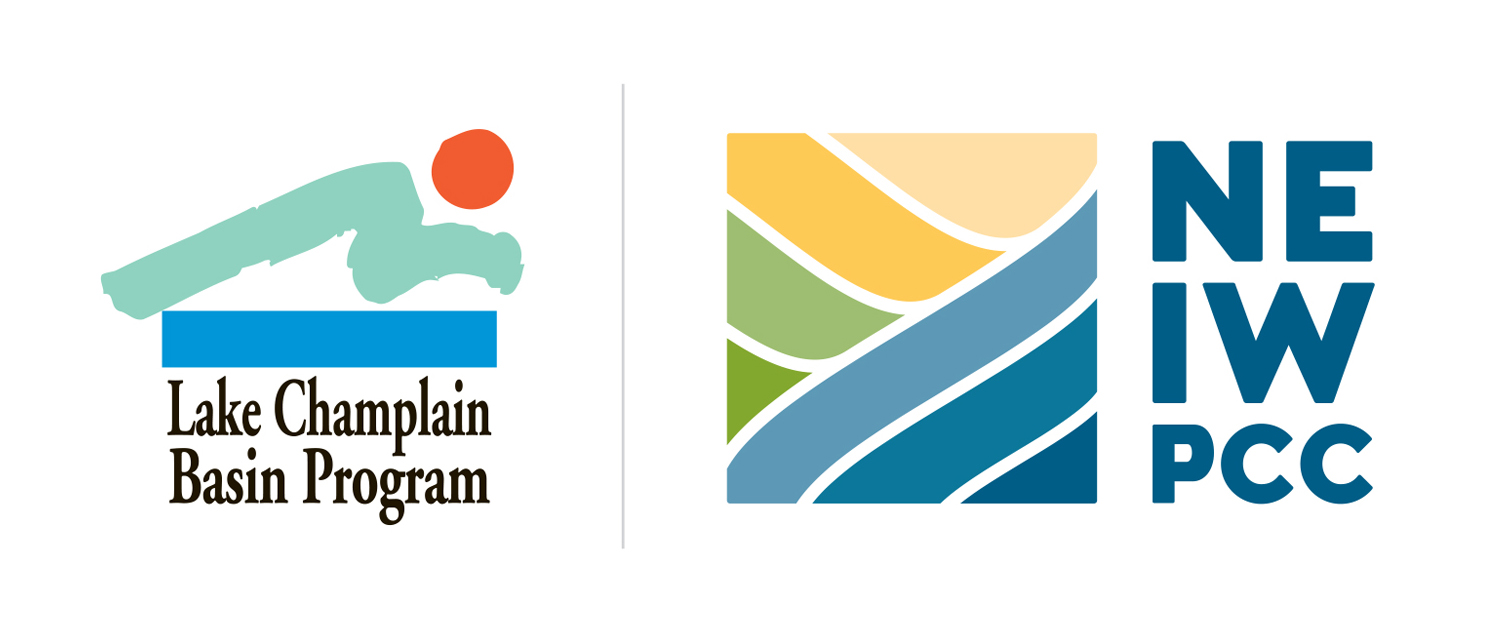The Lake Champlain Basin Program Thanks Patrick and Marcelle Leahy for their Support
Grand Isle, VT – Senator Leahy announced today that he will be retiring in 2023, at the end of his current term. The Lake Champlain Basin Program thanks Patrick and Marcelle Leahy for their nearly five decades of service to our country, to Vermont, and to Lake Champlain. Their dedication to Lake Champlain will leave a lasting legacy well beyond the lifetimes of our current generations of stakeholders in the Basin. Pillars of this legacy include the passage of the Lake Champlain Special Designation Act and the creation of the Champlain Valley National Heritage Partnership. These pieces of legislation create opportunities for inter-jurisdictional collaboration and allow the U.S. Federal government to direct funds toward this important work.
The Lake Champlain Special Designation Act
Senator Leahy worked with his colleagues in Congress, notably Senators Moynihan and D’Amato from New York and his fellow Vermonter Senator Jeffords, to create the Lake Champlain Special Designation Act of 1990, which codified the importance of inter-jurisdictional cooperation in the management of Lake Champlain and its basin. The Lake Champlain Basin Program, created through this legislation, now coordinates and funds efforts to benefit the Lake Champlain Basin’s water quality, fisheries, wetlands, wildlife, recreation, and cultural resources. This mission is accomplished through coordination of management agencies across the Basin, through distribution of funding to support monitoring and research programs, and through grants to directly address resource concerns such as nutrient pollution, aquatic invasive species, and to inform the public on critical watershed issues. Funding to LCBP for this work is provided by the Environmental Protection Agency, Great Lakes Fishery Commission, and the National Park Service through agreements with NEIWPCC.
The Champlain Valley National Heritage Partnership
Senator Patrick Leahy has supported the cultural and historical resources of Lake Champlain for decades. He secured federal funding to map the entire bottom of Lake Champlain in the 1990s and early 2000s in response to the arrival of invasive bottom-dwelling zebra mussels, which threatened submerged cultural resources. The research uncovered dozens of unknown shipwrecks, including the Revolutionary War gunboat, Spitfire, which sank shortly after the 1776 Battle of Valcour.
Senator Leahy worked to appropriate $507,000 to help Vermont and New York mark the 400th anniversary of Samuel de Champlain’s 1609 explorations of the region. The Quadricentennial of Champlain’s voyage was a platform to celebrate, highlight and showcase Native American and Franco-American history and culture in 2009. The Leahys were highly active in marking the anniversary, participating in many events and ceremonies. Marcelle Leahy served as the honorary chair of the Champlain Franco-American Heritage Committee. Senator Leahy supported Senator Jim Jeffords’ efforts to create a National Heritage Area (NHA) in the Champlain Valley. Established in 2006, the Champlain Valley National Heritage Partnership has provided more than 200 grants totaling $1.5 million thanks to Senator Leahy’s annual efforts on the appropriations committee. In 2013, the Senator was responsible for restoring NHA funding to the Senate’s budget after it had been eliminated. Senator Leahy’s efforts allowed 48 National Heritage Areas across the country to continue operating with federal support. As in many types of efforts, cultural heritage and historical organizations across the county have Senator Leahy to thank, in part, for their success.
Funding for the Lake Champlain Basin Program
More than $100 million in U.S. Environmental Protection Agency funding for Lake Champlain has been routed through the Lake Champlain Special Designation Act since 1991, with at least an additional $40 million anticipated over the next 5 years through the recently signed Infrastructure Investment and Jobs Act. The Lake Champlain Basin Program and state partners have leveraged these funds to build and support a monitoring program to document changes in water quality, to reduce pollution to the Lake, to restore the Lake’s fisheries, to reduce the impact and spread of aquatic invasive species, to support the communities of the basin, and to help the basin’s stakeholders understand the role they each play in the health of the Lake. In addition, Senator Leahy secured funding for Lake Champlain through the Great Lakes Fishery Commission, allowing for increased collaboration and support across the international border with Québec, and through the National Park Service for the Champlain Valley National Heritage Partnership to increase interpretation and protection of the Champlain Valley’s unique history and cultural heritage resources. In addition to support for the LCBP, Senator Leahy has helped direct hundreds of millions of dollars in federal funding to Lake Champlain through several agencies within the U.S. Department of Interior and the U.S. Department of Agriculture, and via the Lake Champlain Sea Grant Institute, the International Joint Commission, and the U.S. Army Corps of Engineers.
Legacy for the Future
Lake Champlain is in a vastly different place today than it was when Senator Leahy first ran for his Senate seat in 1974. The U.S. Clean Water Act was only two years old at that point, and much of the potential in that landmark legislation had yet to be realized in the waters of the United States. Much of the Lake Champlain fishery had nearly collapsed due to overfishing, poor water quality, and habitat loss. North Beach in Burlington was closed for the entire summer of 1970, due to poor water quality. Lake Champlain was a considered a “dumping ground” for waste from industries in the basin. Boats, including commercial barges, traversed the lake through the connecting canal systems, carrying new invasive species to Lake Champlain. Very few people talked about the health of Lake Champlain and its basin, or were even aware that it should be a concern or how the Lake’s health might impact their lives. Some of these legacy issues still are ecosystem or public health challenges today.
Thanks in large part to the great efforts of Senator Leahy and the resources and leadership he has brought to Lake Champlain,
- Lake Champlain provides high-quality drinking water to more than 145,000 people every day;
- Lake Champlain fish can be safely enjoyed as part of a healthy diet, when consumption advisories are followed;
- The Lake Champlain Basin’s rivers and lakes are safe for swimming at most times;
- Almost 40% of the land area in the Lake Champlain Basin is conserved in some way;
- Landlocked Atlantic salmon have more access to historic river habitat as dam removal, fish ladders, trapping and trucking the fish help extend their historic range;
- Stocking of lake trout will now be reduced, due to successful natural reproduction;
- Many regions of Lake Champlain have phosphorus concentrations that are often near or below targeted limits;
- With new phosphorus bans in effect, numerous technology upgrades at wastewater facilities across the basin, and new effluent limits established, phosphorus delivered to Lake Champlain from New York, Vermont, and Québec wastewater treatment facilities continues to be well below targeted phosphorus loading limits;
- About 64% of the combined sewer overflow discharge points in New York and Vermont have been eliminated since 1990, and work continues to address contributing stormwater runoff issues;
- Efforts to manage water chestnut have been successful at reducing the percentage of lake area covered by this invasive plant at the southern end of Lake Champlain;
- School programs are educating students about basin issues, providing a foundation for informed decisions about the Lake’s challenges;
- Public outreach programs are helping to inform all community members about watershed issues, including at the Lake Champlain Basin Program Resource Room at ECHO at the Leahy Center for Lake Champlain seven days per week.
The Lake Champlain Basin Program wishes Senator and Mrs. Leahy, our Lake Champlain champions, the best of health as they plan for their 2023 retirement in Vermont where they will enjoy well-earned time with their family and friends at home, and on Lake Champlain!
-end-
The Lake Champlain Basin Program coordinates and funds efforts that benefit the Lake Champlain Basin’s water quality, fisheries, wetlands, wildlife, recreation, and cultural resources. The program works in partnership with federal agencies, state and provincial agencies from New York, Vermont, and Québec, local communities, businesses, and citizen groups. NEIWPCC—a regional commission that helps the states of the Northeast preserve and advance water quality—serves as the primary program administrator of LCBP at the request of the Lake Champlain Steering Committee and administers the program’s personnel and finances. LCBP is a program partner of NEIWPCC. For further information, contact the Lake Champlain Basin Program, 54 West Shore Road, Grand Isle, VT at (802) 372-3213 / (800) 468-5227 or visit www.lcbp.org.

